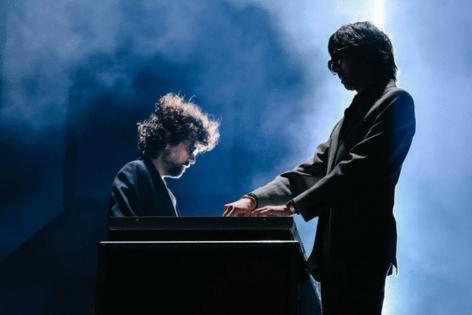Dance duo Justice just crushed Coachella. 8 years between albums, 'We don't like to be too exposed'
Published in Entertainment News
LOS ANGELES — At peak time on the opening night of the first weekend of Coachella, atop the Outdoor Theater stage, Gaspard Augé and Xavier de Rosnay's silhouettes were unmistakable. The two members of the French electronic duo Justice hovered over a table of inscrutable-looking mixers and audio gear, the lanky Augé's curly hair and De Rosnay's angular suit cutting through the fog and panels of LED lights that bent and refracted around them.
The return of the duo — one of the most influential acts in club music since its early-aughts debut — was one of the most anticipated dance sets of the weekend. Eight years since its last proper album, it reasserted that its suave, hooky funk — upended by twitchy samples and grinding distortion — retained all its potency.
"That was great fun," Augé said backstage at the festival the next morning, looking only a little less imposingly cool dressed in satiny civilian clothes. "With every new cycle of a record, we're like, 'Look how fast the musical landscape is evolving, who is going to come see us?' It was a bit stressful especially since the new album was not out yet, but it was great to see people reacting to the new material."
That new album "Hyperdrama," released April 26, is as meticulous and bombastic as any in their tight, impeccable catalog. But with a new crop of top-tier guest vocalists (Tame Impala, Miguel and Thundercat among them), it has the most crossover appeal since their groundbreaking 2007 debut.
"We started with the idea that it was too late to be late," De Rosnay laughed. "We're like, 'Let's take as long as it's gonna take, with unlimited time and unlimited resources to make this recording. Let's let's push it as far as we can go and see what happens.'"
Ever since it rose from the heady 2000s Parisian club scene built around its label Ed Banger, Justice sounded like dance music but acted like a classic rock act. The chattier De Rosnay and contemplative Augé built an iconography straight out of a Black Sabbath double-gatefold vinyl, with a scholar's attention to Steely Dan's analog signal chains. They took what they needed from club music on hits like "D.A.N.C.E." while aiming much bigger — acts from The Weeknd to U2 and Red Hot Chili Peppers were huge fans. It's fitting that their 2019 Grammy win for dance/electronic album came from "Woman Worldwide," a live-remix LP pulling from 2016's "Woman," hits more like the Who's "Live At Leeds" or MC5's "Kick Out the Jams."
When they got back in studio post-pandemic, they wanted to shake up their longstanding approach to tracking live instruments themselves, then serrating them digitally. They were intrigued by the structures of modern hip-hop, where tracks smash together in chaotic, exhilarating pivots. They figured it out with "Incognito," a centerpiece of "Hyperdrama" that flips back and forth from orchestral swells to hi-NRG synth pop to white-knuckle noise.
"We had these type of tracks where they have these abrupt ruptures, kind of like a hardcore aesthetic, but composed in a way that is a bit melancholic," De Rosnay said. "We wrote as many parts as possible, until we could get to the juice of our music, that one loop we can listen to forever, and scrub the rest. Everything is rave, then everything is disco, with no overlapping elements."
Tracks such as the thrashing, nervous "Generator" abut gentler, campy-vampy material such as "Moonlight Rendez-vous." To tie it all together, the pair turned to a formidable roster of guest vocalists, whose melodic chops give "Hyperdrama" some structure and tenderness. Justice has long made creative use of vocals and samples, but with Tame Impala's Kevin Parker on "Neverender" and "One Night/All Night," Miguel's velveteen leads on "Saturnine" and Thundercat's exultant falsetto on "The End," the album feels grounded through all the hard pulls across genre.
They chose vocalists that were "all very independent in the sense that they perform and produce their music themselves with no compromise," De Rosnay said, noting contributions from indie and R&B acts such as Rimon, Connan Mockasin and the Flints.
...continued
©2024 Los Angeles Times. Visit latimes.com. Distributed by Tribune Content Agency, LLC.







Comments